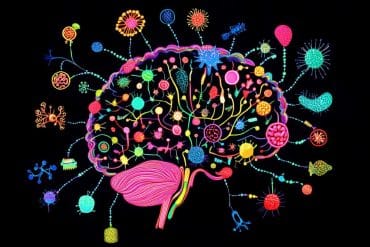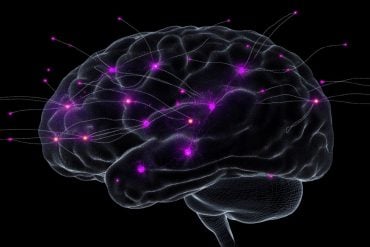Summary: Researchers discovered an exciting new role for a widely known protein, ubiquitin, particularly in its K-63 form.
They found K-63 ubiquitin selectively influences fear memory formation in female brains, potentially contributing to post-traumatic stress disorder (PTSD).
This discovery sheds light on why women are more likely to suffer from PTSD and paves the way for developing female-specific therapeutic treatments.
Key Facts:
- Researchers found that K-63 ubiquitin, a variant of the universally present protein ubiquitin, is involved in forming fear memories in the female brain.
- This discovery provides valuable insights into why women are more prone to PTSD and could guide the development of gender-specific PTSD treatments.
- The research was led by Ph.D. candidate Kayla Farrell and Associate Professor Tim Jarome at Virginia Tech’s School of Animal Sciences, and supported by the National Institute of Mental Health.
Source: Virginia Tech
From humans to plants to single-cell organisms, there’s a protein that rules them all.
This protein does general housekeeping of the cells, regulating them through normal daily functions.
Virginia Tech researchers found that one specific form of this ubiquitous protein has a different function in the female brains – it helps regulate events in the memory that cause post-traumatic stress disorder (PTSD).
“The protein is primarily thought of as a protein that marks other proteins to be destroyed,” said Tim Jarome, an associate professor in the College of Agriculture and Life Sciences’ School of Animal Sciences.
“For it to be doing this function in the context of PTSD in females is very surprising.”
This protein, ubiquitin, even has its name originating from ubiquitous because of its presence across all walks of life. The form of this protein that the researchers could manipulate, called K-63, was selective in forming fear memories in the female brain.
“Oftentimes, molecules are found in the brain that are involved in forming these fear-based memories in both sexes, and this is the first time that we found one that’s selectively involved in one sex,” Jarome said.
“In particular, this was found in the sex that seems to be more likely to have PTSD. It’s rare to find these mechanisms that are specific to one sex in terms of regulating the underlying factors that cause PTSD.”
The discovery could lead to the development of better therapeutic treatments. Kayla Farrell, a Ph.D. candidate in the School of Animal Sciences, was the project lead.
The research was published recently in Molecular Psychiatry in the Nature Portfolio of Journals. The research was supported by a grant from the National Institute of Mental Health.
PTSD is a complex disorder with a variety of therapeutic treatment options that include pharmacological approaches. By having a specific molecule to target, pharmacological approaches could be considered.
“Right now, treatment options are not very effective and the success rate isn’t very good,” Jarome said.
“PTSD is not created equal among patients, and we know females are more likely to have it. The therapeutic approaches that we take to treat it might have to differ between males and females. This may be a mechanism in which we could specifically target treatment in females as a way to treat PTSD.”
About this PTSD research news
Author: Max Esterhuizen
Source: Virginia Tech
Contact: Max Esterhuizen – Virginia Tech
Image: The image is credited to Neuroscience News
Original Research: Closed access.
“Proteasome-independent K63 polyubiquitination selectively regulates ATP levels and proteasome activity during fear memory formation in the female amygdala” by Tim Jarome et al. Molecular Psychiatry
Abstract
Proteasome-independent K63 polyubiquitination selectively regulates ATP levels and proteasome activity during fear memory formation in the female amygdala
Females are more likely than males to develop post-traumatic stress disorder (PTSD). However, the neurobiological mechanisms responsible for these sex differences remain elusive.
The ubiquitin proteasome system (UPS) is involved in fear memory formation and implicated in PTSD development. Despite this, proteasome-independent functions of the UPS have rarely been studied in the brain.
Here, using a combination of molecular, biochemical, proteomic, behavioral, and novel genetic approaches, we investigated the role of proteasome-independent lysine-63 (K63)-polyubiquitination, the second most abundant ubiquitin modification in cells, in the amygdala during fear memory formation in male and female rats.
Only females had increased levels of K63-polyubiquitination targeting in the amygdala following fear conditioning, which targeted proteins involved in ATP synthesis and proteasome function.
CRISPR-dCas13b-mediated knockdown of K63-polyubiquitination in the amygdala via editing of the K63 codon in the major ubiquitin gene, Ubc, impaired fear memory in females, but not males, and caused a reduction in learning-related increases in ATP levels and proteasome activity in the female amygdala.
These results suggest that proteasome-independent K63-polyubiquitination is selectively involved in fear memory formation in the female amygdala, where it is involved in the regulation of ATP synthesis and proteasome activity following learning.
This indicates the first link between proteasome-independent and proteasome-dependent UPS functions in the brain during fear memory formation. Importantly, these data are congruent with reported sex differences in PTSD development and may contribute to our understanding of why females are more likely to develop PTSD than males.








